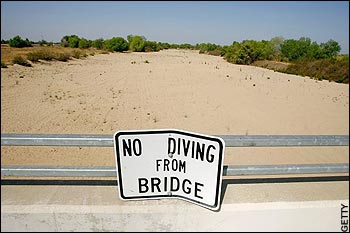Californians could face mandatory water rationing unless they drastically reduce consumption because of a state-wide water crisis, governor Arnold Schwarzenegger has said.
The warning came as he declared the first official drought in California in 17 years, citing two years of arid conditions that threaten the state’s massive agriculture industry and increase the risk of wildfires such as those that destroyed 1,500 homes last October.

Kern River in California is dry and is expected to remain so
The governor called for a state-wide reduction of 20 per cent and issued an executive order commanding water officials to direct supplies to the driest areas, help districts conserve and aid stricken farmers who have already suffered huge losses.
Mr Schwarzenegger said mandatory restrictions could follow if residents and water authorities failed to make cutbacks and another dry winter ensued.
“We must recognise the severity of the crisis that we face,” the Republican governor said.
California has never resorted to statewide water rationing to cope with shortages. Since the last drought, however, its population has shot up as water supplies have decreased.
The governor himself does not have the authority to impose statewide rationing but the Department of Water Resources could slash water supplies to local authorities, who in turn would have to enforce limits.
Some regions already impose rationing with the threat of punitive measures for violators and many areas have appealed for conservation. Restrictions on outdoor water use, such as bans on washing cars or driveways, are in force in some cities along with orders stopping restaurants from automatically serving drinking water.
This week, Los Angeles approved a fleet of “drought busters” to patrol residential areas and enforce a ban on some types of outdoor water use. More districts are expected to impose limits of some kind as the long, hot days of summer loom.
This spring, the driest on record, follows two years of below average rainfall. The situation has been exacerbated by reduced mountain snow packs, which normally provide much of the state’s supply, and a court order limiting the amount of water that can be taken from a key river delta to protect a threatened fish.
“We’re suffering the perfect storm, if you will,” said Timothy Quinn, executive director of the Association of California Water Agencies.
The prospect of cuts alarmed some sectors of the business community who feared it could harm productivity and increase the chance of full-blown recession.


